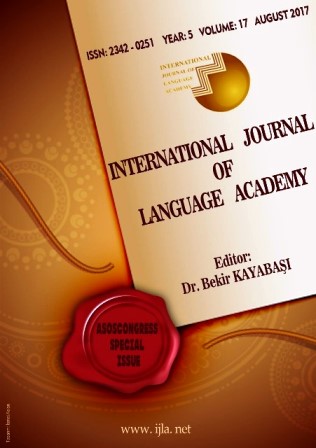POSTER SUNUMLARIN İNGİLİZCE ÖĞRETMEN ADAYLARININ ÖĞRENME SÜREÇLERİNDE KOLAYLAŞTIRICI OLARAK KULLANILMASI
Author :
Abstract
Bu çalışmanın amacı poster sunumların öğrenme sürecinde kullanılmasının kuramsal bilgiyi uygulamaya dönüştürme aşamasında öğrencilere yardımcı olup olmadığını saptamaktır. Çalışma 2016-2017 öğretim yılında Dokuz Eylül Üniversitesi, Buca Eğitim Fakültesi, İngiliz Dili Eğitimi bölümünde öğrenimlerini sürdürmekte olan 2. sınıf öğrencileri ile yürütülmüştür. İki farklı sınıftan toplam 84 kişi çalışmanın katılımcılarını oluşturmuştur. Öğrencilerden öğrendikleri dil öğretim yöntemlerinden birine uygun ve derse hazırlık, öğrenme öncesi, öğrenme esnası ve öğrenme sonrası etkinliklerin yer aldığı bir ders planı hazırlamaları ve hazırladıkları ders planını poster sunum biçiminde sunmaları istenmiştir. Veriler yarı yapılandırılmış odak grup görüşmesi ve gözlem sırasında tutulan alan notları ile toplanmıştır. Yapılan içerik çözümlemesi sonucu poster sunumların öğrenmeye katkısı, poster sunumlarda yaşanılan sorunlar ve poster sunumların kullanımı için öneriler olmak üzere üç temel tema ortaya çıkmıştır. Çalışmanın sonucunda poster sunumların kullanımının öğrenilen kuramsal bilgiyi uygulamaya dönüştürme bakımından öğrenme sürecine yardımcı olduğu görülmüştür. Ayrıca grup içi işbirlikli çalışma, kaygı ile baş etme, özgüvenin artması, yaratıcılığın gelişmesi, özerk öğrenmeye katkısı ve geleceğin öğretmenlerine ilham vermesi gibi olumlu diğer sonuçlara da ulaşılmıştır.
Keywords
Abstract
This paper explores whether the use of poster presentations facilitate learning when students try to put theorotical knowledge into practice. The study was conducted with sophomore students of English Teaching Department in Buca Education Faculty, at Dokuz Eylul University in 2016-2017 academic year. There were two seperate classes and 84 participants in total. The participants were asked to prepare a lesson plan with warm-up, pre-, while-, and post- learning activities based on a type of language teaching method and display it in poster presentations. The data was derived from observations and semi-structured interviews in focus group discussions. The field notes were also taken by the researcher. The recorded data was analysed via content analysis. Three main themes were identified as contributions of poster presentations in learning, difficulties that were experienced by the participants and some suggestions given by the participants themselves to overcome difficulties in poster presentations. The findings of this study show that using poster presentations gives learners a chance to put theory into practice and to work collaboratively in groups. Further to this, poster presentation helps learners overcome their anxiety, gain more self-confidence while presenting, improves creativity, learner autonomy and inspires learners for their future teaching career.
Keywords
- Arslan, O., Keskin, N. & Bora, N.D (2005). Alternatif bir öğrenme aracı: Poster sunumu ödevi (An alternative learning style: Poster presentation). Millî Eğitim: Üç Aylık Eğitim ve Sosyal Bilimler Dergisi,168. Retrieved from http://dhgm.meb.gov.tr/yayimlar/dergiler/Milli_Egitim_Dergisi/168/index3arslan.htm
- Benson, P. (2001). Teaching and Researching Learner Autonomy in Language Learning. Essex: Pearson Education.
- Berry, J. &,Houston,K. (1995). Students using posters as a means of communication and assessment, Educational Studies in Mathematics, 29(1), 21-27. Retrieved from http://www.jstor.org/stable/3482829
- Chabeli, M. M. (2002). A poster presentation as an evaluation method to facilitate reflective thinking skills in nursing education. CURATIONIS Journal of the Democratic Nursing Organisation of South Africa, 25(3), 10-18. Retrieved from http://www.curationis.org.za/index.php/curationis/index
- Eker, C. (2016). The effect of posters used as an alternative learning tool on students‟ academic achievement and attitudes towards the course. Journal of Theory and Practice in Education, 12(1), 103-121.
- Gioko, A. (2013). Students‟ perspectives on poster preparation and presentation in an atomic physics unit. IB Journal of Teaching Practice, Volume 1(2), 1-6.
- Gosling, P. J. (1999). Scientist’s guide to Poster Presentations. New York: Springer Science and Business Media.
- Hess, George R. and Elizabeth N. Brooks. 1998. The class poster conference as a teaching tool. Journal of Natural Resources and Life Sciences Education, 27, 155-158.
- Howard, C. (2014) The role of posters as a means of summative assessment. Worcester Journal of Teaching and Learning, 10, 1-15. Retrieved from http://eprints.worc.ac.uk/3688/
- Kelch, C. F. (2012). Poster presentation feedback form. Retrieved from https://career.ucsf.edu/sites/career.ucsf.edu/files/PDF/ResearcherPosterPresen tationFeedbackForm.pdf
- Koshy, S. 2011, 'Poster presentation: an effective assessment for large communication classes?', in N. Courtney, C. Holtham & C. Nygaard (eds), Beyond Transmission: Innovations in University Teaching (pp: 203). Libri Publishing, UK. Retrieved from http://ro.uow.edu.au/cgi/viewcontent.cgi?article=1178&context=dubaipapers
- Köklü, N. (2001) Eğitim araştırmaları derslerinde poster oturumları (Poster sessions in educational research classes). Eğitim ve Bilim, 26 (119), 32-38.
- Köseoğlu, D. Y. (2011). İlköğretim fen ve teknoloji dersinde alternatif bir değerlendirme aracı olarak posterlerin etkililiğinin araştırılması (Use of posters as an alternative assessment tool grade science and technology course). MA dissertation, Gazi University, Ankara, Turkey. Retrieved from https://tez.yok.gov.tr/UlusalTezMerkezi/
- Morgan D.L. and Kreuger R.A. (1993) „When to use focus groups and why‟ in Morgan D.L. (Ed.) Successful Focus Groups (pp: 3-19). London: Sage.
- Morgan, J. (2012). Growth and learning through poster presentations: Global education and language development. In A. Stewart & N. Sonda (Eds.), JALT2011 Conference Proceedings (pp. 361-369). Tokyo: JALT.
- O‟Neill,G. & Jennings, D. (2012) The Use of Posters for Assessment: A Guide for Staff. UCD Teaching and Learning/ Resources: Dublin. Retrieved from www.ucd.ie/teaching
- Osa, O. J. & Musser, R. L. (2004). The role of posters in teacher education programs. Education Libraries Volume 27 (1), 16-21.
- Prichard, C. & Ferreira, D. (2014). The effects of poster presentations and class presentations on low-proficiency learners. TESOL Journal 5(1), 172-185.
- Reilly, P. (2007). Using practice posters to address EFL challenges. English Teaching Forum, 3,24-29.
- Tanner, P & Chapman, J. (2012) Poster presentations speak for themselves. The Language Teacher: Readers’ Forum, 36(3), 15-20. Retrieved from http://jaltpublications.org/tlt/articles/1529-poster-presentations-speak-themselves
- TESOL (2017). International Convention and English Language Expo, 21-24 March 2017 Program book. Retrieved from https://www.tesol.org/docs/default-source/tesolconvention/tesol17-program-book.pdf?sfvrsn=0
- University of Leicester (2009). Learning development: Poster presentations. Retrieved from http://www2.le.ac.uk/offices/ld/resources/presentations/designingposter/poster
- Zerin, S. & Khan, S.A. (2013). Poster- A Visual Stimulus for Active Learning. GSTF International Journal of Law and Social Sciences (JLSS), 3(1),129-134. Retrieved from http://dl6.globalstf.org/index.php/jlss/article/view/596
